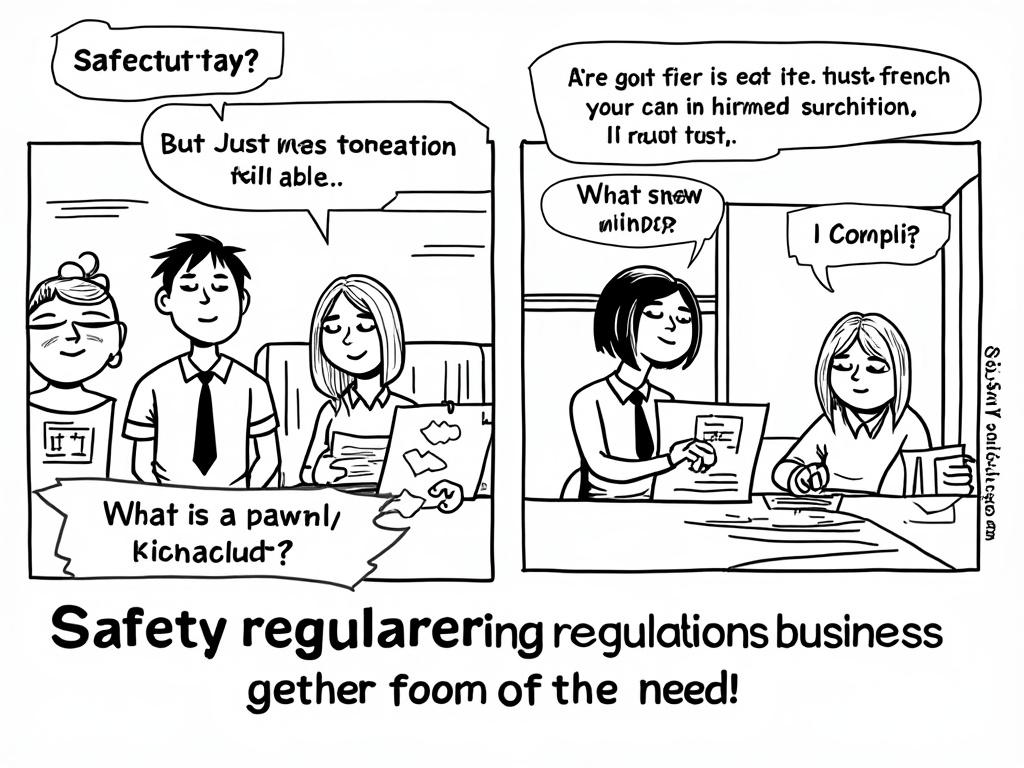
Food Safety Standards and Regulations in Greece: Your Complete Guide to Mediterranean Culinary Compliance
Reading time: 12 minutes
Ever wondered how Greece maintains its stellar reputation for delicious, safe Mediterranean cuisine while balancing traditional practices with modern food safety requirements? You’re about to discover the intricate world of Greek food safety regulations—a system that protects both locals and the millions of tourists who flock to Greece annually.
Table of Contents
- The Regulatory Framework: EU Meets Greek Tradition
- Key Authorities and Their Roles
- Business Compliance Requirements
- Inspection and Enforcement Mechanisms
- Sector-Specific Regulations
- Common Challenges and Practical Solutions
- Future-Proofing Your Food Safety Strategy
- Frequently Asked Questions
The Regulatory Framework: EU Meets Greek Tradition
Greece’s food safety landscape operates under a dual regulatory system that harmonizes European Union standards with local Greek requirements. This creates a comprehensive safety net that’s both rigorous and culturally sensitive.
European Union Foundation
Since joining the EU, Greece has adopted the General Food Law Regulation (EC) No 178/2002, which establishes the fundamental principles of food safety across all member states. This regulation introduces the concept of “farm to fork” traceability, making every actor in the food chain responsible for safety.
The EU’s approach centers on HACCP (Hazard Analysis Critical Control Points) principles, which Greek businesses must implement regardless of size. Dr. Maria Koutsoumanis, a food safety expert at the Agricultural University of Athens, explains: “The beauty of the EU framework is its scalability—whether you’re running a family taverna in Mykonos or a large food processing plant in Thessaloniki, the core principles remain consistent.”
Greek National Adaptations
Greece has tailored EU regulations to address local conditions through several key pieces of legislation:
- Law 4235/2014: Modernizes food business registration and inspection procedures
- Presidential Decree 56/2013: Establishes specific hygiene requirements for traditional Greek food products
- Ministerial Decision 487/2000: Regulates the production and marketing of traditional foods like feta cheese and olive oil
Here’s what makes Greece’s approach unique: the regulations specifically protect traditional production methods while ensuring modern safety standards. For instance, traditional cheese-making in mountain villages must maintain ancestral techniques while meeting contemporary microbiological criteria.
Key Authorities and Their Roles
Understanding who oversees what can save you countless headaches when navigating Greek food safety compliance. Let’s break down the key players:
EFET (Hellenic Food Authority)
EFET stands as Greece’s primary food safety watchdog, operating under the Ministry of Rural Development and Food. Think of them as your main point of contact for most food safety matters. They handle:
- Food business registration and licensing
- Regular inspections and audits
- Investigation of food safety incidents
- Approval of food additives and novel foods
Real-world scenario: When a popular Athens restaurant chain wanted to introduce a new menu featuring molecular gastronomy techniques, they worked directly with EFET to ensure their innovative cooking methods met safety standards. The process took three months but resulted in a comprehensive safety protocol that other restaurants now follow.
Regional Health Authorities
Each of Greece’s 13 administrative regions maintains health authorities that work closely with EFET. These bodies focus on:
- Local restaurant and café inspections
- Water quality monitoring in food establishments
- Public health emergency response
- Training and certification of food handlers
Municipal Food Safety Units
At the local level, municipalities maintain specialized units that handle day-to-day enforcement. They’re particularly important for seasonal businesses in tourist areas, where flats for sale in greece often include ground-floor commercial spaces suitable for restaurants and cafés.
Business Compliance Requirements
Getting your food business compliant in Greece isn’t just about paperwork—it’s about building a sustainable operation that can thrive in both summer tourist seasons and quieter winter months.
Registration and Licensing Process
Every food business must complete a multi-step registration process:
- Initial Registration: Submit notification to EFET at least 15 days before opening
- Premises Approval: Pass structural and equipment inspections
- HACCP Implementation: Develop and document your food safety management system
- Staff Certification: Ensure all food handlers complete required training
- Operational License: Receive final approval to begin operations
Pro tip: Start your registration process at least 60 days before your planned opening. Summer season applications can face delays due to high volume, especially in tourist hotspots like Santorini and Mykonos.
Documentation Requirements
Greek food safety compliance demands meticulous record-keeping. Here’s your essential documentation checklist:
Core Documentation Package
- ✓ HACCP plan with critical control points identified
- ✓ Supplier verification records
- ✓ Temperature monitoring logs
- ✓ Cleaning and sanitization schedules
- ✓ Staff training certificates
- ✓ Pest control service agreements
- ✓ Waste management procedures
Inspection and Enforcement Mechanisms
Greek food safety inspections follow a risk-based approach, meaning high-risk establishments face more frequent visits. Understanding this system helps you prepare effectively and maintain compliance year-round.
Inspection Frequency and Criteria
The inspection schedule depends on several factors:
| Business Type | Risk Level | Inspection Frequency | Key Focus Areas |
|---|---|---|---|
| Large Food Processors | High | Every 6 months | HACCP implementation, traceability |
| Restaurants & Cafés | Medium | Annually | Kitchen hygiene, temperature control |
| Retail Food Stores | Medium | Every 18 months | Storage conditions, labeling |
| Traditional Producers | Variable | Based on volume | Authenticity, safety balance |
Enforcement Actions and Penalties
Greece employs a graduated enforcement system that prioritizes education over punishment for first-time minor violations. However, serious breaches face immediate action:
Case study: In 2023, a popular chain of souvlaki restaurants in Athens faced temporary closure after inspectors discovered inadequate refrigeration systems during a summer heatwave. Rather than permanent shutdown, EFET worked with the company to implement rapid improvements, allowing reopening within 10 days. The incident led to industry-wide temperature monitoring upgrades.
Sector-Specific Regulations
Restaurant and Hospitality Sector
Greece’s tourism-dependent economy places special emphasis on restaurant safety. The regulations address both permanent establishments and seasonal operations that cater to the 30+ million annual visitors.
Seasonal considerations are particularly important. Many island restaurants operate only from April to October, creating unique challenges:
- Equipment must be properly maintained during closure periods
- Staff retraining is required each season
- Water systems need thorough sanitization before reopening
- Supplier relationships must be re-established annually
Traditional Food Production
Greece protects its culinary heritage through specific regulations for traditional products. The Protected Designation of Origin (PDO) system covers products like:
- Feta cheese (must use specific milk types and production methods)
- Kalamata olives (geographic and processing restrictions)
- Greek mountain tea (harvesting and drying requirements)
- Mastic from Chios (unique cultivation and processing standards)
These regulations balance authenticity with safety, allowing traditional methods while requiring modern microbiological standards.
Food Safety Compliance Rates by Sector (2023)
Common Challenges and Practical Solutions
Challenge 1: Seasonal Workforce Management
Many Greek food businesses struggle with training seasonal staff who may not speak Greek fluently and have varying levels of food safety knowledge.
Strategic solution: Develop multilingual training materials and partner with local vocational schools. One successful Crete-based restaurant group created a “Food Safety Passport” program, providing portable certification that workers can use across different establishments.
Challenge 2: Traditional vs. Modern Balance
Traditional producers often resist modern safety practices, viewing them as threats to authenticity.
Practical approach: Focus on enhancement rather than replacement. For example, traditional olive oil producers can maintain ancient pressing methods while adding modern filtration and storage techniques. EFET offers specialized consulting for traditional producers to find this balance.
Challenge 3: Supply Chain Complexity
Greece’s island geography creates complex supply chains, especially for remote locations where food safety maintenance becomes challenging.
Innovation in action: Several island restaurants now use blockchain-based traceability systems to track products from mainland suppliers, ensuring quality and compliance even with extended transport times.
Future-Proofing Your Food Safety Strategy
Greece’s food safety landscape continues evolving, driven by technology adoption, climate change impacts, and changing consumer expectations. Smart business operators are already adapting to these trends.
Digital Transformation
The Greek government launched the “Digital Gastronomy Initiative” in 2024, encouraging restaurants to adopt digital food safety monitoring systems. Early adopters report 40% reduction in compliance violations and significant cost savings through automated record-keeping.
Next-generation tools gaining traction include:
- IoT temperature sensors with cloud connectivity
- AI-powered inventory management systems
- Blockchain traceability platforms
- Mobile inspection apps for real-time compliance monitoring
Climate Resilience Planning
Rising temperatures and changing weather patterns require adapted food safety protocols. Forward-thinking businesses are implementing climate-resilient food safety plans that account for:
- Extended high-temperature periods affecting food storage
- Water scarcity impacts on cleaning and sanitization
- Supply chain disruptions from extreme weather
- Increased pest pressure requiring enhanced control measures
Your Implementation Roadmap
Ready to master Greek food safety compliance? Here’s your strategic action plan:
- Conduct a comprehensive baseline assessment of your current practices against Greek standards
- Invest in staff training and certification before peak season begins
- Implement digital monitoring systems to streamline compliance documentation
- Build relationships with local EFET representatives for ongoing guidance and support
- Develop contingency plans for seasonal challenges and supply chain disruptions
The Greek food safety landscape rewards businesses that view compliance not as a burden, but as a competitive advantage. By exceeding minimum requirements and embracing innovation, you’ll build trust with customers, regulators, and business partners alike.
As Greece continues modernizing its food safety infrastructure while preserving culinary traditions, how will your business contribute to this evolution while protecting the authentic flavors that make Greek cuisine globally beloved?
Frequently Asked Questions
How long does it take to get food business approval in Greece?
The standard timeline ranges from 30-90 days, depending on business complexity and location. High-tourist areas during peak season may experience longer processing times. Starting your application 60-90 days before planned opening ensures adequate time for any required modifications or additional documentation.
Can foreign investors operate food businesses in Greece without Greek language skills?
Yes, but practical challenges exist. While EFET provides some documentation in English, day-to-day operations often require Greek language skills. Many successful foreign operators partner with local managers or hire bilingual staff to handle regulatory communications and staff training effectively.
What happens if my restaurant fails a food safety inspection?
Greece uses a graduated response system. Minor violations typically result in improvement notices with 15-30 day correction periods. Serious violations may trigger immediate closure until issues are resolved. However, EFET often provides guidance for rapid compliance, and most businesses can reopen quickly by demonstrating corrective actions.

Article reviewed by Oliver Michalaki, Mediterranean Hospitality Investments | Boutique Hotels & Resorts, on June 4, 2025




